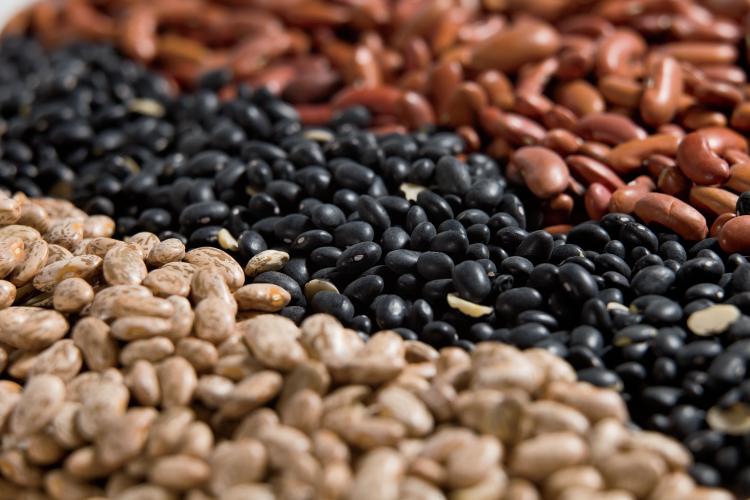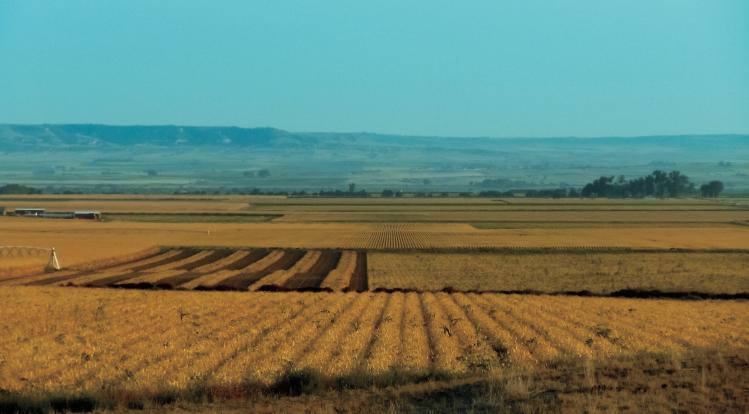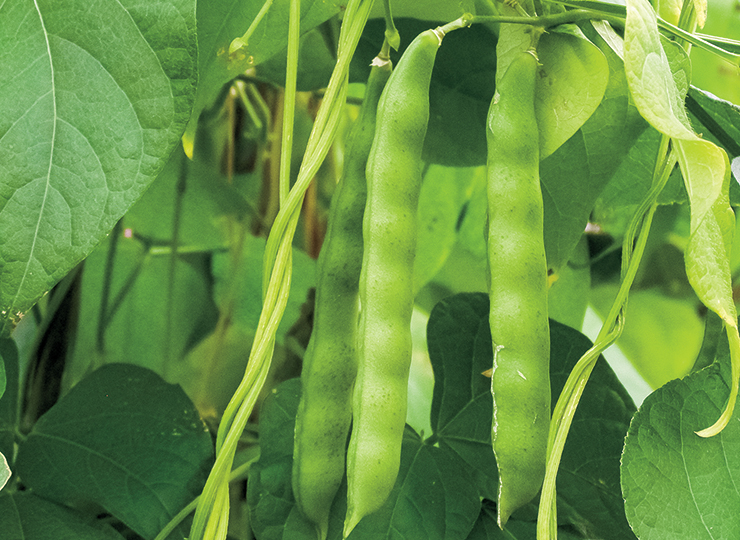Home > Nebraska > Nebraska Crops & Livestock > Bountiful Beans: Nebraska Leading Grower of Dry Edible Beans
Bountiful Beans: Nebraska Leading Grower of Dry Edible Beans

Whether you prefer white chicken chili with Great Northern beans or classic beef chili with pinto and kidney beans, you should thank a Nebraska farmer. The state leads the nation in production of Great Northern beans and is the second-leading state for pinto bean production. In fact, Nebraska ranks third nationally for all dry bean production.
Kidney, pinto, Great Northern, navy, black and pink beans all fall under the umbrella of dry edible beans, or legumes grown to their mature stage, dried and harvested for the seed within their pods. In 2012, dry bean production in Nebraska exceeded 3 million hundredweights – that’s 300 million pounds.
Climate and Conservation
As with any crop, weather plays a critical role in Nebraska’s status as an ideal locale for bean production, which requires low humidity and an arid climate.
“Dry edible beans only grow well in western Nebraska, where the climate is different than eastern Nebraska,” explains Lynn Reuter with the Nebraska Dry Bean Commission. Many farmers choose to grow beans because they help conserve water.
“Using little water for dry beans can allow water to be used for crops that need more,” Reuter says.

Kevin Kelley, who owns seed distributor and processor Kelley Bean Co., agrees they’re perfect rotation crops for farmers who also grow corn, sugar beets, wheat and alfalfa.
“Dry beans produce nitrogen to naturally fix the soil, plus beans are the last crops to be planted and the first to be harvested – they have a short growing season,” he says.
No beans about it, Kelley certainly knows his legumes. His Scottsbluff-based company, which employs 225 people, sells seeds to farmers and then purchases the harvested beans to sell to supermarkets and distributors.
But before they end up on grocery store shelves, the beans have to be processed. When Kelley Bean acquired KBC Trading and Processing (a former ConAgra division) in 2005, it became the canning industry’s top supplier. Brands such as Bush’s, Hormel and many more use beans from seeds developed by the researchers at Kelley Bean for their specific canning characteristics.
And Kelley Bean is not alone. Other dry bean companies in Nebraska, mostly located in the western part of the state, near where the crop is grown, include Nebraska Bean, Stateline Producers Cooperative, Trinidad Bean, New Alliance Bean, and AK Acres Popcorn Co.
Doug and Cindi Allen are two of the growers that work with Kelley Bean.
“We buy the seeds from Kelley Bean, grow the crop, then sell the grown beans back to Kelley,” Cindi Allen says. The couple raises beans along with corn, wheat and sunflowers on their farm in Ogallala.
“We grow corn for two years and then beans during the third year to get maximum use of our soil,” Allen explains. She says this ensures the best possible yields for the farm, which grows kidney, black and pinto beans.
She enjoys growing a true field-to-fork crop. “I can pick a bucket from the field,” she says, “soak the beans overnight, and serve them the next day in chili or a main meal.”

Packed With Protein
No matter how they’re consumed, dry beans are an inexpensive, healthy option, Reuter says.
“They are a nutrition powerhouse and an excellent low-fat source of protein, plus beans can reduce heart disease along with certain cancers,” she says. “They are loaded with antioxidants, fiber, complex carbohydrates and vitamins such as folate B. Actually, the folate found in beans helps diminish many birth defects, so beans are an excellent food source for pregnant women.”
Reuter adds that beans are not only low in calories but also a good source of energy.
“If you were stuck on a deserted island and had to pick one food for your ultimate survival, it should be beans,” she says. “In fact, new energy bars have been recently introduced that are packed with pinto bean flour and navy bean flour.”
With all of the associated health benefits, it comes as no surprise that consumers throughout the country eat beans grown in Nebraska.
“In the United States, Nebraska pinto beans are becoming especially popular in restaurant sectors that serve Mexican, Cal-Mex and Tex-Mex dishes,” Reuter says. “Black beans from Nebraska are gaining more recognition in restaurants along both the East and West Coasts.”
The leading export markets for Nebraska-grown pinto beans are Mexico, Dominican Republic and Angola, Reuter says. France, Malaysia and Turkey top the list of foreign markets for great northern beans.
“Dry beans are a vital part of the state’s agricultural economy,” Kelley says, “and Nebraska’s dry edible beans are some of the best – if not the absolute best – in the entire world.”



